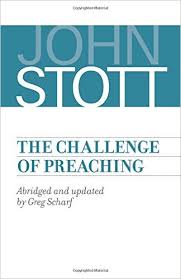 John Stott, The Challenge of Preaching, abridged and updated by Greg Scharf (Grand Rapids, MI: Eerdmans, 2015). Paperback
John Stott, The Challenge of Preaching, abridged and updated by Greg Scharf (Grand Rapids, MI: Eerdmans, 2015). Paperback
Preaching is not the only thing pastors do, but it is one of the most important things—if not the most important thing. Pastors thus need to work at perfecting their craft through constant attention to proper exegesis and hermeneutics, effective introductions and conclusions, and helpful outlines and illustrations. Because it is so useful in all these regards, John Stott’s The Challenge of Preaching should find a prominent place in every pastor’s library.
First published in 1982 as Between Two Worlds, The Challenge of Preaching now appears in a third edition, abridged and updated by Greg Scharf, and published by Eerdmans. In many ways, it is a primer on preaching, an introduction to the craft. But like the best primers, it is a touchstone that helps experienced preachers test the quality of their preaching.
Chapter 1 identifies three challenges to preaching: “Distrust of authority makes people unwilling to listen,” Stott writes. “Electronic advances have changed the expectations of both listeners and preachers. The atmosphere of doubt makes many preachers too tentative.” Despite these challenges, Stott believes preaching is a theologically necessary task, and in Chapter 2, he outlines its theological foundations focusing on God’s revelation, Scripture’s authority, the Church’s need of biblical renewal, the pastoral role of teaching and preaching, and preaching’s expository character.
Chapter 3 identifies the essential task of preaching as building a bridge between “the biblical world and the modern world.” Theological conservatives typically focus on the former, while theological liberals on the latter, but Stott insists we must keep eyes on both. “We must struggle to relate God’s unchanging word to our ever-changing world without sacrificing truth or despising relevance.”
Stott next turns to how preachers prepare themselves through personal study (Chapter 4) and their sermons through careful organization (Chapter 5). Chapter 4 struck me with particular force. It is easy for many activities to fill pastors’ calendars. Time for study becomes a luxury. If preaching is as important as Stott says it is, however—and I believe he’s on track biblically—failing to schedule regular time for reading and reflection is failing to do one’s job with adequate preparation. In the short term, this can be managed, but in the long term, one’s ministry becomes spiritually, emotionally, and intellectually weak.
Chapter 5 talks about writing one’s sermon. This is a nuts-and-bolts chapter that focuses on selecting the text, isolating the main thought, arranging your material, adding your conclusion, and then—when everything is in place—planning an introduction that draws the congregation in and prepares them to hear the Word of God.
Preaching cannot be reduced to the mechanics of sermon-writing, however. Who preaches is as important as what is preached. In short, the pastor’s life itself preaches the gospel and gives credibility to the sermon. Chapter 6 focuses on sincerity and earnestness. Stott writes: “To be sincere is to mean what we say and to do what we say; to be earnest is also to feel what we say.”
Chapter 7 focuses on courage and humility. “Preachers, like prophets, believe they bring a word from God, and are not free to change it,” Stott notes. “Therefore all preachers have at various times to choose between truth with unpopularity and falsehood with popularity.” This requires courage. But speaking unpopular truths can render us “stubborn or arrogant.” Like Elijah, we can complain, “I alone am left.” The antidote to this arrogance is “a humble mind, humble motives, and humble dependence.”
The Challenge of Preaching is a short book: 102 pages in the main body and another 23 pages in the appendices. It can be read in a single sitting. I highly recommend it to new pastors because it covers the whole range of preaching topics quickly and memorably. However, I also recommend it to veteran pastors. It has a diagnostic simplicity that will help them identify and correct bad habits they have developed.
I conclude with one final quote that warmed my Pentecostal heart: “At the same time [that we are studying] we should be praying, crying humbly to God for light from the Spirit of truth. Like Moses, we must beg him to show us his glory (Ex. 33:18). Study is no substitute for prayer; prayer is no substitute for study. We must do both. It may help to study on our knees, because this attitude reminds us that we worship the God who reveals himself in the Bible, and we are humble before him.”
Amen to that!
—–
P.S. If you found my review helpful, please vote “Yes” on my Amazon.com review page.

